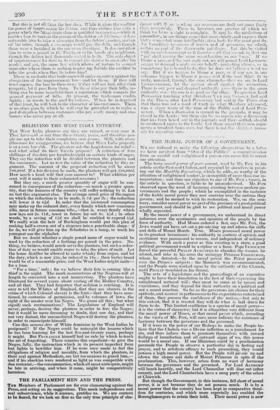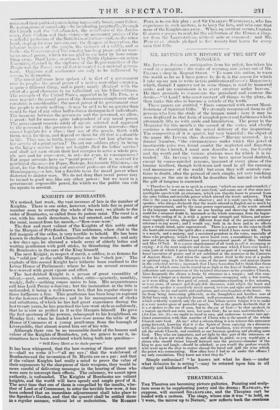THE MORAL POWER OF A GOVERNMENT.
WE are induced to make the following observations by a letter we have received from " One of the Public :" a communication • from so candid and enlightened a person can never fail to arrest our attention.
The term moral power of ..zove:.mnent, used by Mr. Fox in his article on the Fast and Cholera, and repeated by ourselves in point- ing out the Monthly Repository, which he edits, as worthy of the
attention of enlightened readers, is susceptible of more than one in- terpretation; and thus our objection to one of Mr. Fox's tenets, in the article in question, is liable to be misunderstood. Mr. Fox observed upon the want of harmony existing between modern go- vernments and the people ; which he exemplified in the instance of the feeble moral power they now exercise over the nations they govern; and he seemed to wish its restoration. We, on the con- trary, consider moral power no part of the province of a good political government, and should be glad to see political and moral power wholly separated.
By the moral power of a government, we understand its direct influence over the sentiments and opinions of the people by the force of authority. Had Moses ordered a fast, says Mr. Fox, the Jews would not have set out a pic-nic-ing up and adown the cliffs and dells of Mount Horeb. True. Moses possessed moral power in its greatest luxuriance; his authority in matters of opinion and sentiment was paramount to reason, and independent of ordinary evidence. With such a power as this existing in a state, a good political government would be a cipher or a farce. Pope INNOCENT forced the powerful PHILIP AUGUSTUS to abandon the woman he adored, and take to his arms the unhappy Princess INGEBURGE, whom he detested,—by the moral power the Priest possessed over the Prince's subjects : the Monarch was excommunicated, and the People were worked upon by the authority of the Church, until PHILIP trembled on his throne.
The acts of a legislature and the proceedings of an executive ought to have their foundation in the fact of their expressing the enlightened national will: they must be come at by reason and . experience, and they depend for their authority on a political and not a moral sanction. So far as the governors are chosen for their aptitude, and answer in performance to the expectations entertained of them, they possess the confidence of the nation,—but only to this extent, that it is trusted they will do what is laid down for them to do. This limited confidence is a species of moral power— . it is the virtue of character; but it is altogether very different from the moral power of Moses, or that moral power which, according to the views of Mr. Fox, will once more indicate the existence of harmony between the governors and the governed. If it were in the power of our Bishops to make the People be- lieve that the Cholera was a Divine infliction as a punishment for sin, and thus induce them to prostrate themselves with inward feelings of humiliation and all outward signs of wo, this power would he a moral one. If our Ministers could by a proclamation persuade the People to observe a particular day in fasting and prayer, and to attribute efficacy to such proceeding, they would' possess a high moral power. But the People will pic-nic up and adown the slopes and dells of Mount Primrose in spite of the proclamation. This, however, arises from no want of harmony between the governors and the governed. For Lord ALTHORP will lunch heartily, and the Lord Chancellor will dine out (after - sunset), and the Lord Chamberlain have a snug party of the select at Chiswick.
But though the Government, in this instance, fall short of moral power, it is not because they do not possess much. It is by a moral power that the country has been kept in comparative thral- dom for centuries, and which more especially has enabled the Boroughmongers to retain their hold. Their moral power is now gOIRI; and their political power,being imptoperly based, must f:dlow. By assumptions of superiority—by inculcating perpetually, through the Church ciAd the Schoolmaster, the et ee!lence of the Aristo- cracy, their wisdom and their virtue—by DICI.ccuary praises of the vvonderful porfection of the British Coestituti.;o—and, on the other band, mieging for ever into our ear.: the dangers of innovation, the inherent badness of the people, the violence of a rabble, and so forth—the Coyeenment of this county has long possee.ed an enor- mous moml power, which we ate glad to i;ee hour. by hour crum- bling away. Good Laws, Saila:on:A by Public Opinion—an active Executive, checked by the vigilance of the Representatives of the People and the PreJs—are all that is wanted in a national govern- recut. Opinions meal sentiments are only to be influenced by reason, by di;eussion. The moral influence here spoken of, is that of a government over its people : the moral power of a nation over other countries, is quite a different thing, and is preity nearly ideal ieal with the eilixt of a good character in an individual on his fellow-citizens. The example of the United States, appealed to by Mr. Fox, is a case in point : the immoral power of the American example over other countries is considerable: the moral power of its government over the people is nearly nothing—it may be said to be no greater than would be that of any other half-a-dozen distinguished individuals. The harmony between the governors and the governed, we allow, is great; but. for reasons quite independent of any moral power. The government consists solely of agents selected and approved by the governed ; the governors have no sinister interests—they cannot legislate for a close: they are of the people, think with them, work for them, and depend on them for all that is estimable in lifo. They are, in truth, upper servants—but how glorious is the service of a great nation! Do not our soldiers glory in being in the King's service? have not knights died for ladies' service? and shall not men strain their last energies to Sene a whole peo- ple now anti ter ever—now, in act—for ever, in consequenves ? But upper servants have no " moral power :" that is reserved ihr privileged classes,—for Popes, Bishops, Aristocratic Ministers,—in short, for the flourishing and universal professors of the science of Humbuggery,—a low, but a forcible term for moral power when distorted to sinister uses. We do not deny that moral power may be turned to good use, like any other power; but we want in a government reTomible power, for which we the public can call the agents to account.



























 Previous page
Previous page